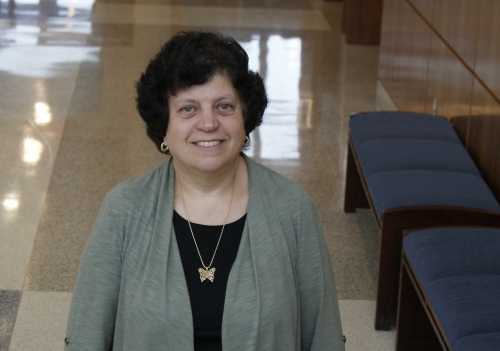Dr. Linda Copel shines light on stigma

Professor Linda Carman Copel PhD, RN, PMHCNS, BC, CNE, ANEF, NCC, FAPA wants to eliminate negativity and destructive judgements that people with serious health problems, especially mental health problems, experience. A psychiatric-mental health clinical specialist, this researcher has been working on the concepts of self-stigma and double stigma as experienced by women with disabilities (WWD) and the families of clients with mental illness. A generous mentor, she has extended her concept analysis work-which interested PhD student and alumnus Khamis Al-Mamari, MSN, RN —to look at stigma in mental health and the influence stigma has on clients and mental health care in Oman. The two have been researching this area together for over a year.
How did this quietly prolific researcher, who has long had a community-based practice, move in this direction? “My clinical work has been with people who experience discrimination, prejudice, abuse, and stereotypes,” explains Dr. Copel, “I have witnessed families experience stigma by ssociation. Unfortunately, like bullying, others are quick to make intentional remarks, subtle innuendos, or hurtful humor to put down others perceived as different or struggling with some issue.” Dr. Copel says, “I have been working with clients and their families to combat stigma through teaching them to practice various forms of advocacy. It's a long and complex process to assist people to address feelings of self-doubt and shame, and to remember that they are not the illness, but rather a person managing their illness. This work has been a part of my practice for a long time.”
Self-stigma can have an impact on health. Dr. Copel describes the concept of stigma as a” widespread, universal experience which is a major cause of personal suffering and a deterrent to obtaining health care.” She notes that “vulnerable populations, such as women with disabilities (WWD) who have experienced intimate partner violence (IPV), are at risk for several of the various forms of stigma, especially self-stigma. Health care providers and social scientists believe that stigma has a negative influence on people’s lives by contributing to high levels of stress and social disadvantages.”
And what of double stigma? “Double stigma occurs when a person with a health problem, serious issue, or troublesome situation concurrently experiences another condition such as mental illness or physical disability,” notes Dr. Copel. She goes on to say, “For women with disabilities, the physical disability is one type of situation which may cause the women to experience public stigma and then the erosion of their mental health due to the abuse encounters contributes to self-stigma.”
Dr. Copel’s research project The Concept of Self-Stigma: A Clinical Investigation (which described self-stigma by WWD who had experienced IPV, identified additional types of stigma and also compared findings to a stigma model constructed through concept analysis) and their joint concept analysis Stigma in Mental Health: A Concept Analysis were accepted as oral presentations at the STTI Biennial Convention in November in Las Vegas.
